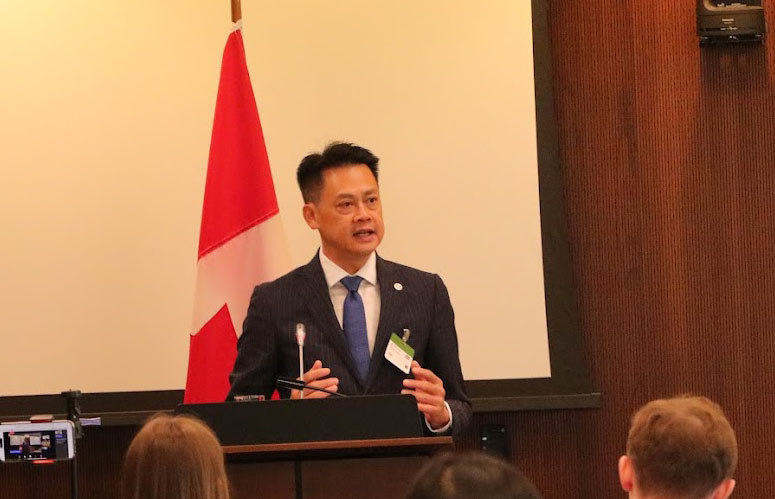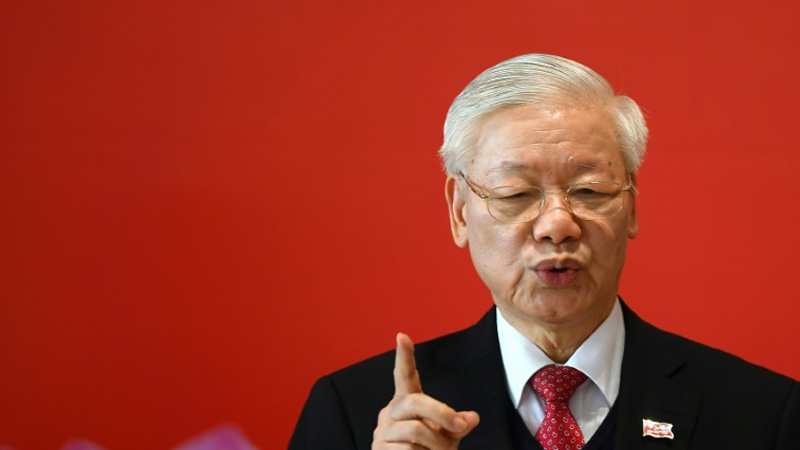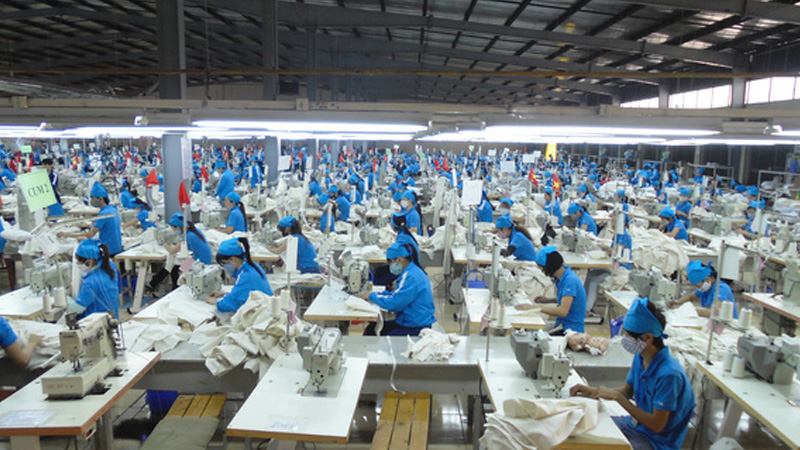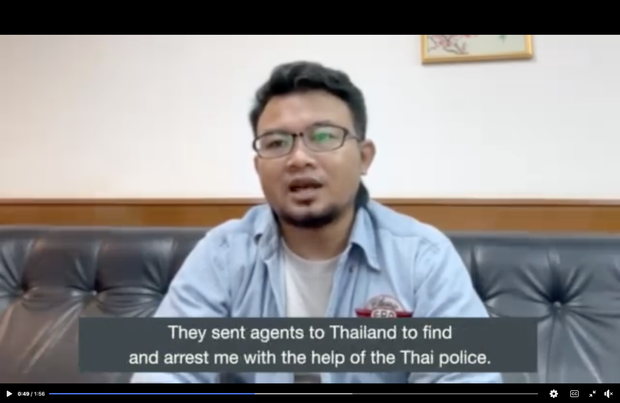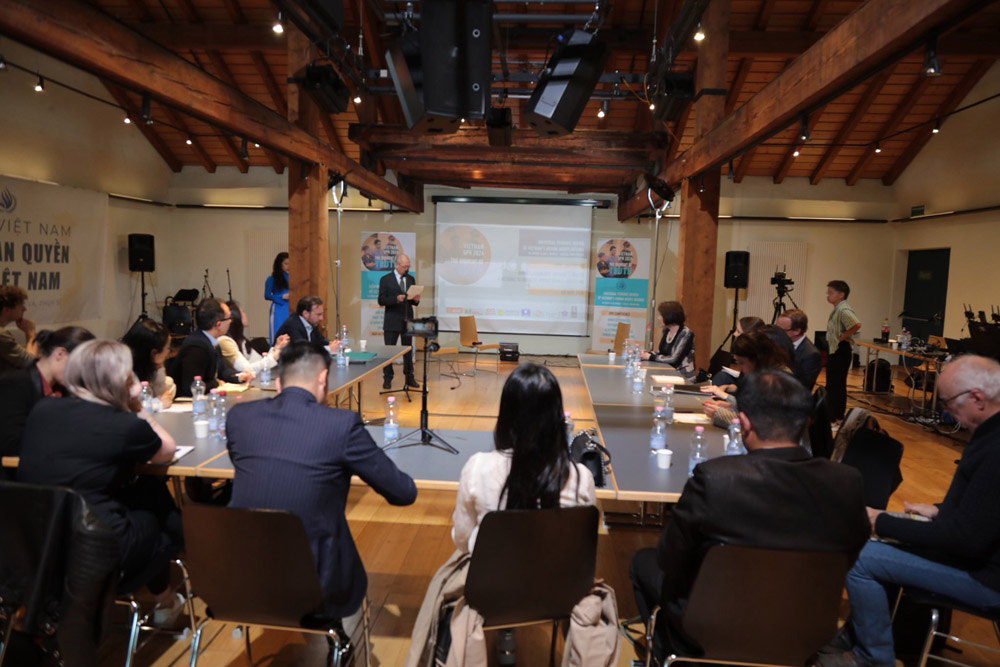Remarks at the Canadian Parliament
by Duy Hoang, Executive Director Viet Tan
Thank you MP Sgro for chairing today’s event. It’s a pleasure for me to be back here at the Canadian Parliament and in the company of so many MPs who support human rights.
This time last year, I had the honor of meeting many of you as Canada was preparing to announce a new strategy for the Indo-Pacific.
As Canada pursues this long-term, multi-faceted strategy, it will undoubtedly prioritize certain relationships. Japan, South Korea and Australia certainly. These are all democracies and important economies. But perhaps Vietnam will be considered a strategic partner as well.
The question is how Canada can engage Vietnam while furthering its democratic values?
I deeply believe that human rights must be an integral part of the overall strategy to foster a more secure and prosperous Indo-Pacific. I want to briefly discuss three issues, or case studies, where human rights promotion is critical.
The first is climate change.
Canada is one of the leaders behind the Just Energy Transition Partnership. And Vietnam is a country threatened by rising seas and extreme weather events. But while the Hanoi government welcomes money from donors for energy transition and climate finance, they’re increasingly fearful of local civil society talking about Vietnam’s specific energy challenges and advocating for policy changes.
Since 2022, leading environmental activists in Vietnam have been rounded up. In separate cases, environmentalist Nguy Thi Khanh, lawyer and environmental activist Dang Dinh Bach, and NGO activist Hoang Thi Minh Hong were all convicted of financial crimes as a way to silence their environmental advocacy. In Vietnam today, free speech and protecting the environment cannot be separated.
The Canadian government should pause all forms of financial aid to Vietnam until these activists are released. It is critical that the international community support Vietnam’s nascent civil society. Tackling climate change requires a whole-of-society effort. There’s no way Vietnam, or any country, can address its environmental challenges without fresh thinking and free debate.
A second area is security cooperation.
I strongly applaud Canada’s support for freedom navigation — especially with regards to the Taiwan Strait and the South China Sea. And we would welcome the ongoing defense policy dialogue between Ottawa and Hanoi — if such cooperation were focused on improving the professionalism of the People’s Army of Vietnam and its ability to respond to external threats.
Under Vietnam’s current law on defense, the People’s Army of Vietnam has four objectives: 1) protecting the country, 2) serving the party and government, 3) pursuing economic development, and 4) fulfilling its international duty.
Objectives 2 and 3 are highly problematic. Clearly, any military committed to protecting the ruling party and government is potentially a threat to its own people. In addition, a military that’s given a role in the economy is (on a good day) inefficient and (on all other days) open to corruption.
So as Canada considers capacity building initiatives with Vietnam’s military, it’s critical that these efforts help the PAVN to become more professional and to focus its mission solely on external defense, i.e., protecting the country. I think you would agree that Canadian taxpayer money should not subsidize any military that exists to protect the ruling party.

A third topic I want to mention is transnational repression.
I don’t have to tell you that it’s totally unacceptable for any government — whether a friendly government or a so-called partner — to abduct or harm its political opponents on foreign soil, including on Canadian soil. Unfortunately, transnational repression is like a slippery slope and if left unchecked could get even worse.
In recent years, the Vietnamese intelligence services have abducted a critic in Germany, kidnapped at least two bloggers seeking asylum in Thailand, and attacked activists in Cambodia with acid. This is state-sponsored terrorism. What is to stop Hanoi from targeting critics from the large Vietnamese diaspora in Thailand — or here in Canada?
I hope the international community can unite against transnational repression. No country purporting to respect international law and claiming to be a responsible actor can get away with targeting political opponents living in other jurisdictions. There needs to be an independent investigation of all credible instances of transnational repression and any government official who is implicated must be heavily sanctioned.
Looking ahead.
There are many pressing human rights challenges. Defending and empowering civil society activists, helping to professionalize Vietnam’s military, and saying no to transnational repression would be a good start toward fostering a Vietnam that can tackle environmental challenges, contribute to regional security, and respect international norms.
Now, the Vietnamese government might resist some of these nudges. And I know that some policymakers warn that if you’re too hard on the Vietnamese government, it will then lean toward China. In my view, that worry is overblown.
It is in the interest of Vietnam as a people and country to support a free and open Indo-Pacific. Lately, Beijing has been pitching a so-called “community of common destiny”. If asked, I’m pretty certain an overwhelming majority of Vietnamese would say “no thank you” to a shared destiny with the PRC.
While the Hanoi regime can dismiss public opinion, it can’t ignore the will of the people completely. Importantly, the communist party leadership has acknowledged that the status quo is untenable and that Vietnam needs a more balanced foreign policy — one that is less overtly tilted toward China. So we’ll not lose Vietnam to China by promoting human rights.
Moreover, Vietnam is currently a member of the UN Human Rights Council. In its candidacy statement last year, the Hanoi government declared that it “believes in the universality of human rights.” With membership comes responsibility — especially as this December 10th marks the 75th anniversary of the Universal Declaration of Human Rights.
I encourage you to stand with Vietnam’s human rights activists and civil society. Promoting a freer Vietnam would help advance Canada’s strategic objectives for the Indo-Pacific. If I could leave you with one message: it’s that a free and open Indo-Pacific requires free and open societies.
Thank you for your support.


